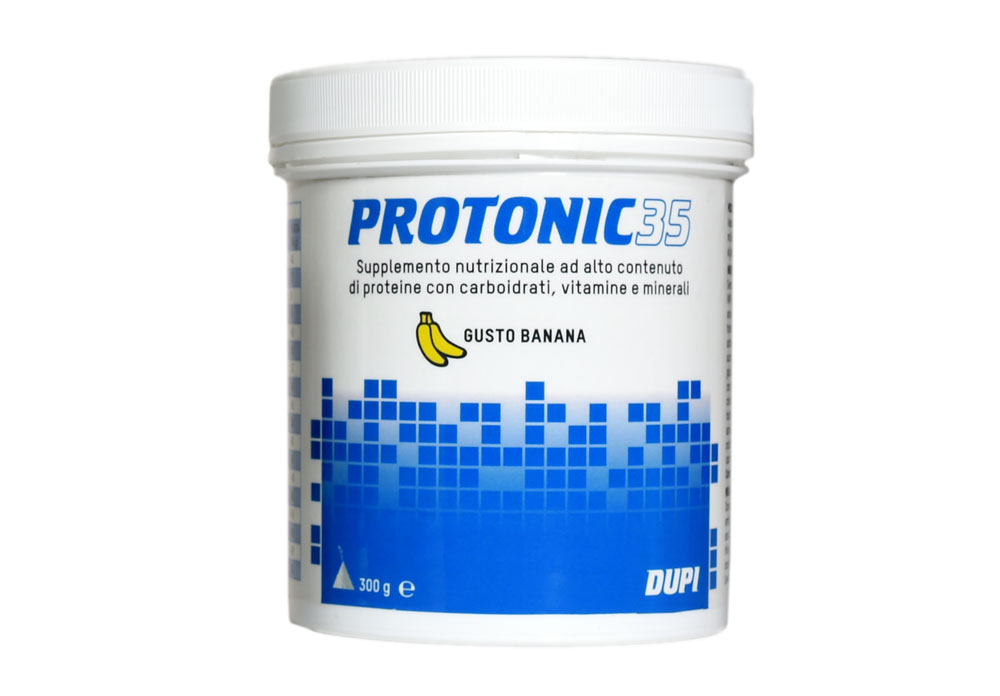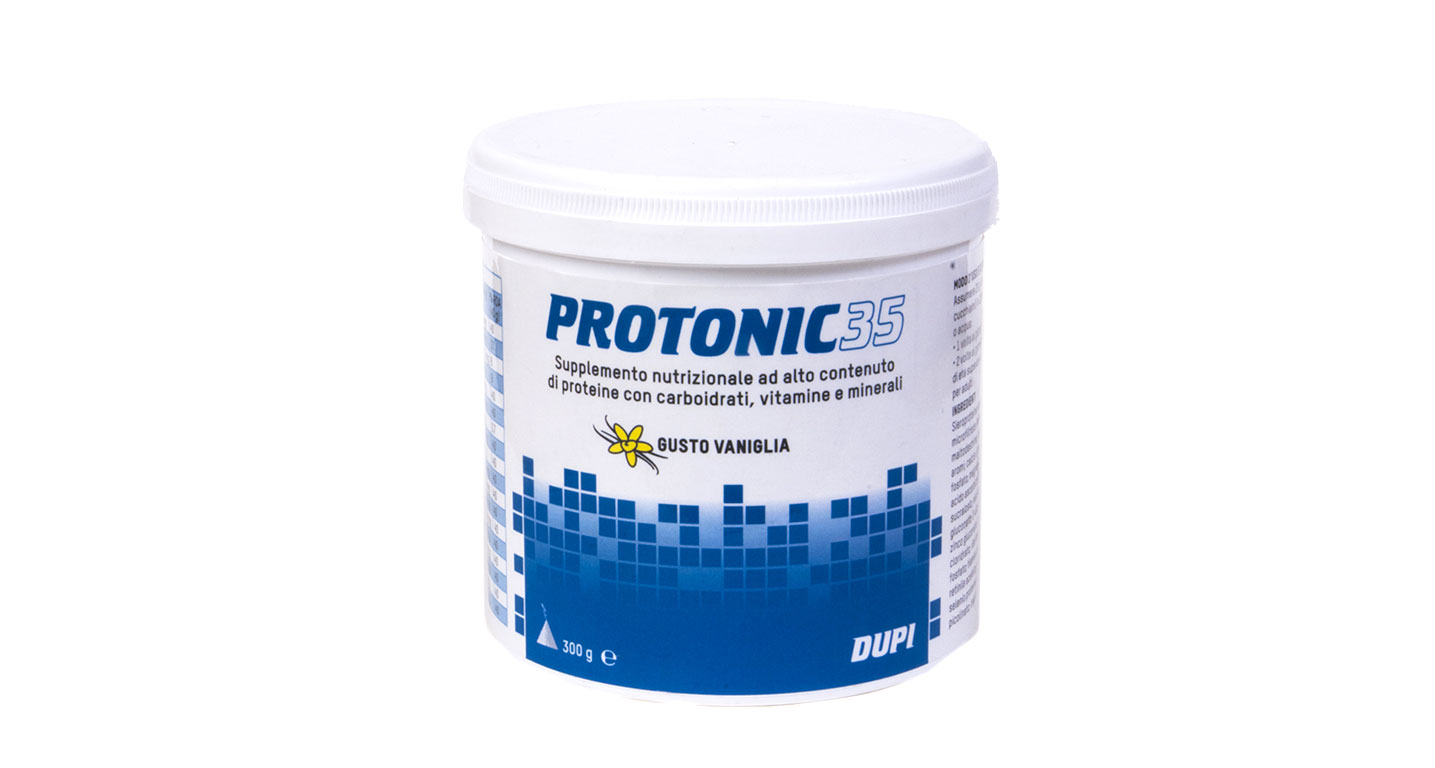Protonic 35
It is a nutritional supplement high in protein with carbohydrates, vitamins and minerals, recommended from the first year of life.
Protonic 35, thanks to its complete and balanced formulation, provides:
- whey protein isolate with high biological value, with a high content of essential amino acids and highly digestible; proteins contribute to the growth and maintenance of muscle mass;
- maltodextrin and fructose, to integrate energy intake;
- vitamins C, B2 and E, selenium and zinc to help protect cells from oxidative stress;
- vitamins A, B6, B9, B12, D, and iron that contribute to the normal function of the immune system
Protonic 35 is indicated in cases of:
LACK OF APPETITE AND CONVALESCENT
Protonic 35 is the ideal tonic for the child during convalescence and a valuable support to the growth of the children that have lost their appetite or engaged in physical activity.
MALNUTRITION DUE TO PEDIATRIC ACUTE OR CHRONIC
Protonic 35 is adequate nutritional support to combat malnutrition in pediatric hospital settings, allowing you to improve the nutritional status of the patients and limiting effects.
In the presence of chronic disease or during a state of convalescence, the child must not only meet its basic needs, but also to recover its “optimal state” to encourage proper growth recovery.
Protonic 35 can also be used as a nutritional supplement for:
THE WOMAN IN PREGNANCY OR DURING BREASTFEEDING
Protonic 35 satisfies the increased caloric and protein requirements during pregnancy and lactation without involving a surplus of calories. In addition, during lactation the amount of vitamins, calcium and minerals in the diet significantly influence the composition of breast milk.
SENIOR
Protonic 35 represents the correct integration to counter sarcopenia in the elderly, in addition, provides a protein of high biological value in line with the recommendations of the SINU (at least 30% protein intake is made up of protein of high biological value).
Dietary supplements are not intended as a substitute for a varied diet, balanced and healthy lifestyle.
Protonic 35 does not contain casein (allergenic and a little digestible); it has a pleasant taste that favors the intake by children and is soluble in water or milk.
Protonic 35 is available in the following flavors chocolate, vanilla and banana.
Dosage:
– one a day up to 3 years
– twice a day for ages above
How to use: Dissolve 20 grams (2 teaspoons) in 200 ml of milk at breakfast and snack. To have a drink even more tasty use a shaker or blender.
Packaging: Powder of 300 g available in the flavors of chocolate, vanilla, banana.
Storage: Store at room temperature in a cool, dry place. Avoid exposure to sources of localized heat, direct sunlight and contact with water. The expiration date refers to the product properly stored. Any slight variation in color is not an indication of quality deterioration of the product. Do not throw out in the environment after use.
Warnings: Do not exceed the recommended daily dose. Keep out of the reach of children under 3 years old. Dietary supplements are not intended as a substitute for a varied diet, a balanced and healthy lifestyle. The product may contain milk derivatives.
Ingredients: Microfiltered whey protein isolate (WPI); maltodextrin; fructose, aromas; calcium citrate; potassium phosphate, magnesium citrate; ascorbic acid; Sweetener: Sucralose; niacin; iron gluconate; D-alpha-tocopherol; zinc gluconate; pyridoxine hydrochloride; Na riboflavin-5-phosphate; thiamine hydrochloride; retinyl acetate; folic acid; selenium proteinate; chromium picolinate; calciferol, cianocobalammina. Contains milk derivatives.
| NUTRITION FACTS | |||
| Ingredients | For 100 g | For 40 g | % RDA (40 g) |
| Calcio | 800 mg | 320 mg | 40 |
| Magnesium | 350 mg | 140 mg | 37 |
| Potassium | 303 mg | 121,2 mg | 6 |
| Fosforo | 145 mg | 58 mg | 8 |
| Vitamin C | 80 mg | 32 mg | 40 |
| Vitamin B3 | 16 mg | 6,4 mg | 40 |
| Iron | 20 mg | 8 mg | 57 |
| Vitamin E | 12 mg | 4,8 mg | 40 |
| Zinc | 10 mg | 4 mg | 40 |
| Vitamin B6 | 1,4 mg | 0,56 mg | 40 |
| Vitamin B2 | 1,4 mg | 0,56 mg | 40 |
| Vitamin B1 | 1,1 mg | 0,44 mg | 40 |
| Vitamin A | 800 mcg | 320 mcg | 40 |
| Folic acid | 200 mcg | 80 mcg | 40 |
| Selenium | 55 mcg | 22 mcg | 40 |
| Cromum | 40 mcg | 16 mcg | 40 |
| Vitamin D3 | 5 mcg | 2 mcg | 40 |
| Vitamin B12 | 2,5 mcg | 1 mcg | 40 |
| NUTRITION FACTS | ||
| Ingredients | for 100 g | for 40 g |
| Energy | 346 kcal1468 kj | 138 kcal587 kj |
| Protein | 35 g | 14 g |
| Carbohydratesof which sugar | 50 g15 g | 20 g6 g |
| Fatsof which saturates | 0,4 g0,3 g | 0,16 g0,12 g |
| Dietary fiber | 1 g | 0,4 g |
| Sodium | – | – |
Calcium and bone mineral density in adolescent girls
In 1993 for 18 months a controlled, randomized, double-blind trial was done to evaluate the effect of calcium supplementation on bone density and bone. Considering a calcium intake from the diet of approximately 960 mg per day, the supplemented group received an increase of about 354 mg/day of calcium reporting an increase in bone density in the spinal cord and throughout the body.
FONT: Calcium supplementation and bone mineral density in adolescent girls. Lloyd T, Andon MB. JAMA. 1993 Aug 18;270(7):841-4.
Requests protein and energy during lactation
It was noted that the caloric and protein needs of women who breastfeed exclusively breast is approximately 670 kcal per day. However, if consider a gradual loss of weight, the net increase required is about 500 kcal per day. In women with adequate lipid reserves, a slightly negative energy balance does not significantly affect breastfeeding.
The increase in protein requirements recommended during breast-feeding is 15 grams per day. However, considering the fraction of non-protein nitrogen in human milk, the increase recommended protein increases to 20 grams per day. The latter value is consistent with data from studies on nitrogen balance in lactating women. In addition, it is unlikely that a low protein intake may influence the volume of milk, but it can definitely alter the nitrogen fractions of milk.
SOURCE: Energy and protein requirements during lactation. Dewey kg. Annu rev nutr. 1997;17:19-36.
related studies:
Bone mineral density changes during lactation: maternal, dietary, and biochemical correlates. Krebs NF, Reidinger CJ. Am J Clin Nutr. 1997 Jun;65(6):1738-46.
Studies in human lactation: milk volumes in lactating women during the onset of lactation and full lactation. Neville mc, Keller R. Am J Clin Nutr. 1988; 48(6):1375-86.
- CATEGORY For Children , For Mom
- TAGS




